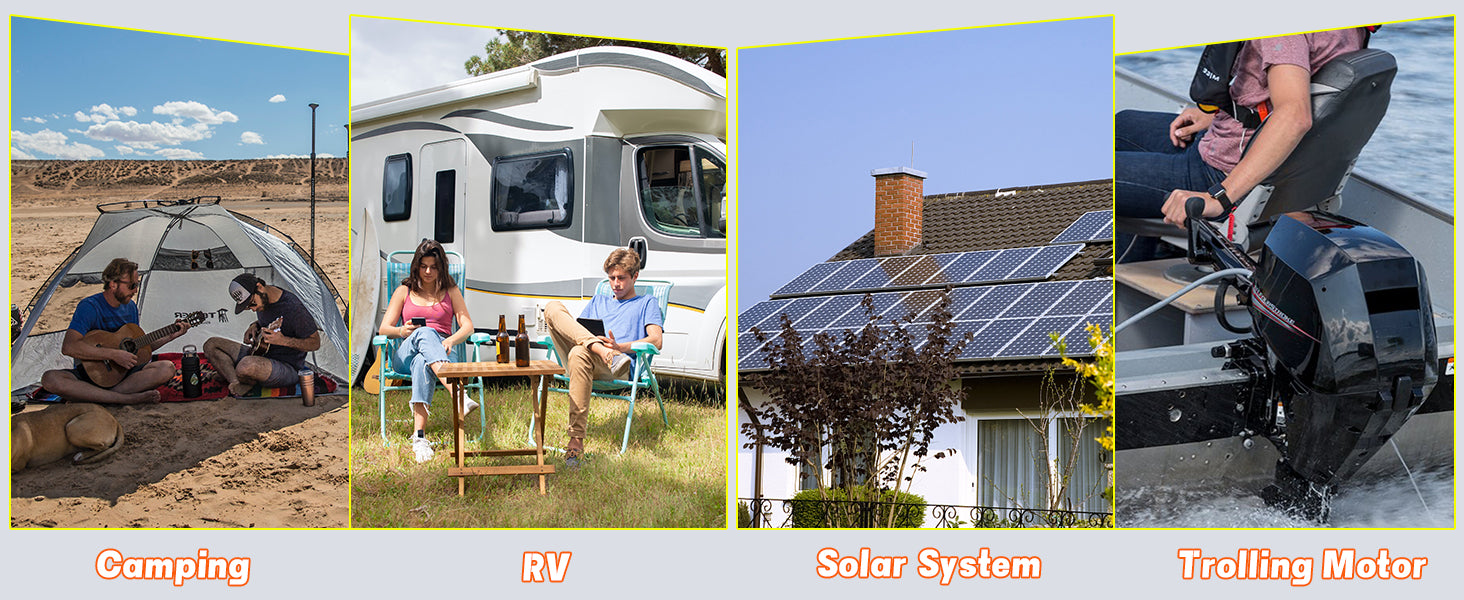Looking to purchase a new battery for your travel trailer? It’s essential to choose the right battery to guarantee a consistent and dependable power source for your trips. With a wide range of options available, it’s important to know your power requirements and the different types of batteries suitable for travel trailers.
In this detailed guide, we will assist you in finding the ideal battery for your travel trailer. From comprehending the various types of batteries to evaluating your power needs, we have you covered.
For those in search of batteries for their travel trailers, there’s a variety to pick from, each boasting unique benefits and things to ponder. The main types include lead-acid batteries, AGM (Absorbent Glass Mat) batteries, and lithium batteries.
1. Lead-Acid Batteries:
- Flooded Lead-Acid (FLA) Batteries: These are the classic deep-cycle batteries often found in RVs and travel trailers. They’re cost-effective but necessitate regular care, like monitoring water levels and applying equalizing charges.
- Absorbent Glass Mat (AGM) Batteries: AGM batteries fall under the category of sealed lead-acid batteries. They’re maintenance-free, capable of withstanding deep discharges, and have a lower risk of leakage, which makes them a favored option for travel trailers.
2. Lithium-Ion Batteries:
- Lithium batteries are gaining traction among travel trailer owners for their greater energy storage capacity, reduced weight, and longer lifespan when compared to lead-acid batteries. They also provide quicker charging and more thorough discharges. However, they come with a higher initial price tag.
3. Gel Batteries:
- Gel batteries are another type of sealed lead-acid battery. They are maintenance-free and resistant to vibration, making them suitable for travel trailers. However, they are less common than flooded lead-acid and AGM batteries.
|
Characteristic |
AGM Battery |
Gel Battery |
Lithium Battery |
|
Depth of Discharge (DoD) |
Typically around 50% |
Similar to AGM, around 50-80% |
Over 80% and even 100% without damage |
|
Lifespan |
300-500 life cycles, 3-5 years |
Similar to AGM, 300-700 life cycles, 2-5 years |
4000-15000 life cycles, 10-15 years |
|
Size and Weight |
Heavier, e.g., 12V 100Ah: 63-70 lbs |
Similar to AGM, e.g., 12V 100Ah: 60-70 lbs |
Lighter, e.g., LiPULS 12V 100Ah Group 24: 21 lbs |
|
Energy Density |
Around 7.23Wh/lbs |
Similar to AGM, around 7-9Wh/lbs |
60.95Wh/lbs |
|
Charge Time and Efficiency |
Longer charge times, lower efficiency |
Similar to AGM, longer charge times, lower efficiency |
Faster charging, higher efficiency |
|
Maintenance |
Minimal, occasional equalization charging |
Similar to AGM, minimal maintenance, no regular equalization charging |
Minimal, no regular equalization charging |
|
Environmentally Friendly |
Recyclable, slightly lower energy density |
Recyclable, slightly lower energy density |
Recyclable, higher energy density, longer lifespan |
|
Safety |
Considered safe, may release hydrogen gas |
Similar to AGM, considered safe, may release hydrogen gas |
No gas generation, no toxic liquids, with BMS |
|
Bluetooth Technology |
Typically not included |
Typically not included |
Included, enables real-time monitoring |
|
Initial Cost |
Lower initial cost |
Similar to AGM, lower initial cost |
Higher initial cost, the superior lifetime cost |
When considering these options, lead-acid batteries present the most economical choice initially. However, they also have the shortest lifespan and demand regular upkeep to avoid harm from sulfation and fluid loss. These batteries are quite heavy and should not be discharged beyond half their capacity.
AGM batteries for travel trailers require less attention than lead-acid types and can be safely discharged to 20%. Despite this, they have a major disadvantage – they are susceptible to damage from overcharging.
Gel batteries are an enhanced version of lead-acid batteries, as they are sealed to eliminate the risk of spills. They operate well in harsh temperature conditions but have a slower charging rate.
For those with space constraints in their travel trailers, lead-acid batteries can take up a substantial amount of it. In contrast, lithium batteries offer the most compact and lightweight solution for travel trailers. Despite their small size, they pack a powerful punch. Their lithium iron phosphate composition grants them excellent stability, efficiency, and safety. These batteries also lead in terms of rapid charging and longest service life, making them a highly attractive option for many as the optimal battery for their travel trailer.

Lithium batteries are the perfect selection for lengthy travel trailer excursions because of their outstanding energy storage capacity and durability. In contrast to conventional lead-acid batteries, lithium batteries provide a much greater power-to-weight ratio, delivering more power in a smaller, lighter package. This is particularly beneficial for travel trailers where minimizing weight and maximizing space are key factors.
Furthermore, lithium batteries have a significantly longer lifespan than lead-acid batteries, ensuring that travelers have a steady power supply throughout their long trips without the hassle of frequent battery replacements. The capability of lithium batteries to maintain a charge for long durations also suits them well for travel trailer use, guaranteeing that power is accessible even after extended periods of disuse.
Additionally, lithium batteries support more efficient charging and discharging, allowing for a more productive utilization of the available energy. This is particularly useful in off-grid or secluded areas where opportunities to recharge may be scarce.
In conclusion, the high energy density, longer lifespan, and effective charging features of lithium batteries make them the most suitable option for travel trailers, offering a dependable and enduring power solution for prolonged travels.






Leave a comment
All comments are moderated before being published.
This site is protected by hCaptcha and the hCaptcha Privacy Policy and Terms of Service apply.